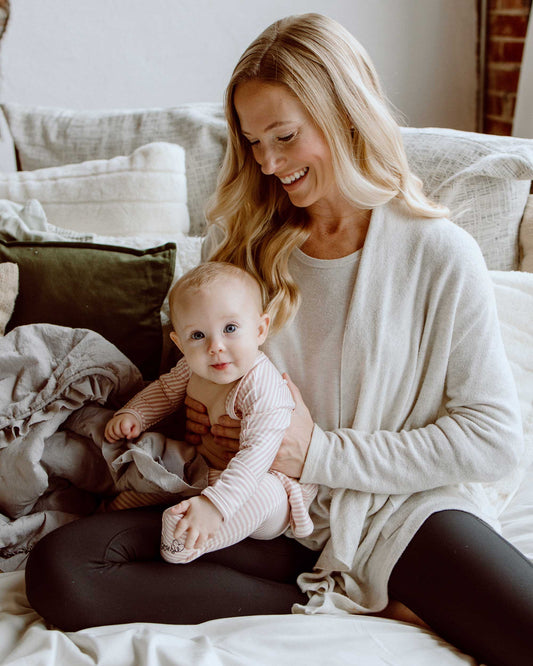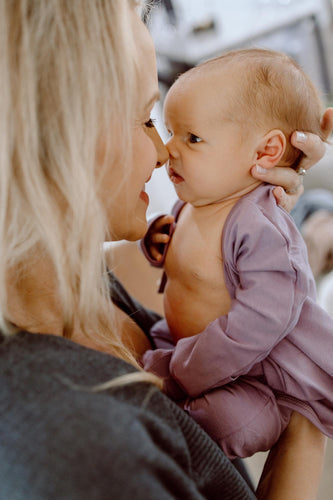Share
Your Oxytocin Generator
Rohini MoreUndeniable fact: When we are in the presence of a baby, we have an irresistible urge to hold, kiss, smell, and snuggle that baby.

Our desire to smooch the chubby little cheeks of every baby we see is partly because those interactions release oxytocin, a hormone that makes us feel good. It’s nicknamed the “love hormone” because childbirth and breastfeeding stimulate surges of oxytocin as well as any activity that promotes bonding.
This “feel good” hormone plays a key role in helping parents form strong attachments to their children (Dewar, 2021).
Here’s a breakdown of what you need to know about oxytocin:
- Low levels of oxytocin are linked to postpartum depression
- Moms and dads who do not bond easily with their children also typically have lower levels of oxytocin
- Bonding with your baby is critical for healthy brain development and sets the stage for their future relationships
- There are simple, natural ways you can increase your levels of oxytocin
By understanding the benefits of oxytocin and what triggers its release, parents can be more intentional about the time they spend with their children. Eye contact, communication and touch all correspond with the total bonding experience. In addition, higher levels of oxytocin contribute to lower levels of stress and anxiety as well as lower blood pressure and heart rates for you and your baby.
Here are some oxytocin boosting activities to help you both relax and connect:
- Singing to your baby
- Holding and cuddling your baby
- Giving your baby a bath
- Massaging your baby with lotion
- Breastfeeding (this floods your body with oxytocin)
- Thinking about how much you love your baby (seriously!)
- Practicing skin-to-skin contact (so easy and impactful.)
Skin-to-skin contact is one of the most effective ways to release oxytocin and bond with your baby. When mom, dad or anyone practices skin-to-skin contact, oxytocin is released in both the baby and the caregiver. The cozy feeling that you both get from oxytocin makes your baby feel safe and treasured. All these wonderful emotions boost your baby’s brain development and establish a closer relationship. Incredible, right?
According to Parenting Science,
“… responsive parenting can have a profound impact on our kids — on their emotional, cognitive, and physical well-being. So snuggle up, and look after your own mental health needs. Parenting can be stressful, and when you’re stressed out, it’s harder to experience — and pass along — the benefits of oxytocin” (Dewar, 2021).
As you hold your adorable oxytocin generator close, take several deep breaths and notice how you feel. Pay attention to the rhythm of your baby’s breath, to the weight of his or her little body resting on your chest and to that enticing, newborn smell. Do you feel it? The blossom of happiness that fills you up like the glow of fire fills a candle jar? That, my friend, is oxytocin. (And a whole lot of love!)
Sources:
Dewar, G. (2021, May 31). Oxytocin affects social bonds and our responses to toxic stress. Can we influence oxytocin in children? Parenting Science.
https://parentingscience.com/oxytocin-in-children-and-parents/
Share
-
Category:
- All posts




